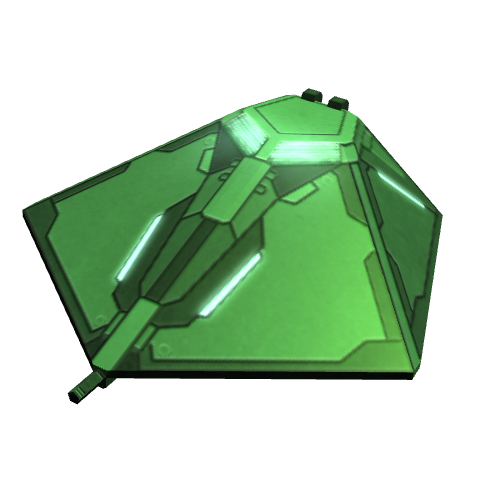Thargoid Robot Fighter (Oolite)
| Thargoid Robot Fighter | |
|---|---|

| |
| Size (metres, W×H×L) | 38 × 9 × 36 |
| Cargo capacity | N/A |
| Cargo bay extension | N/A |
| Maximum speed | 0.45 LM |
| Manoeuvrability | Roll: 2.0 Pitch: 1.0 |
| Energy banks | 2 |
| Energy recharge rate | Medium (3.0) |
| Gun mounts | Forward |
| Missile slots | N/A |
| Shield boosters available | N/A |
| Military shields available | N/A |
| Hyperspace capable | No |
| OXP or standard | Standard |
| Available to player | No |
| Base price | N/A |
Contents
Overview
Thargons are unpiloted, remote-controlled battle drones that are released by Thargoid Warships as reinforcements during a battle. Many an unfortunate pilot was struck with awe and horror when, while he desperately tried to hold up against a Thargoid Warship, he suddenly had to face six adversaries instead of only one. Not so many live to tell the tale.
Notable Features
Thargons are fast, and they almost always come in a swarm. Both of these facts make them fearsome. On top of that, each of them is equipped with a robust Pulse Laser. A lone Thargon, though, is not especially strong. The most important fact to know about Thargons is that they are remotely controlled by their mothership. When they lose the remote contact to their mothership, their AI freezes and they 'die'. However, another Thargoid Warship nearby can assume control over them instead of their original mother.
Tactical Advice for Thargoid Fighters
Usually a Thargoid Warship will release five Thargons (there have been reports about bigger Thargoid ships, that have even more Thargons aboard) when it's in distress. So for an experienced, hard ass pilot without fear, seeing Thargons is actually a good sign, showing that the main ship is running low on energy. Thargoids never back out when out of energy, but use their Thargons instead to keep their opponent busy and thus relieve the strain on their main ship.
Therefore a cold blooded pilot should never bother with the Thargons, but double his effort on the warship, knowing that it is not far from defeat. If there are no other Thargoid capital ships nearby, the Thargons will lose their remote-controlled brain as soon as their mother dies, drifting in space helplessly, becoming easy victims with no self-defense. (see also Dealing with Thargoids)
If he has reached this stage of the battle (many pilots never do, though), the victorious human may decide what to do with the Thargons. Basically he has two options: He can scoop them and sell them as Alien Items on the next market, making a nice profit. Or he can shoot them, thereby earning the 50 credits bounty GalCop has put on every Thargon and being awarded a kill for each of them, which will bring him another step closer towards becoming Elite.
Role in Thargoid research
As dead Thargons can be scooped, many of them have found their way to GalCop's research facilities, like the naval research and development complex on Ribilebi. There they are torn apart and examined carefully. It is from scrutinizing these derelict fighter drones that most of the knowledge about Thargoids and their technology actually stems from. Naturally during the research they have become the best understood part of Thargoid technology. Their energy system is fairly well understood, and can be compared to human technology, in which it would rank as having 2 energy banks, which recharge at a medium speed. Also their laser system poses no major questions to researchers. It is also well understood that the distictive green laser colour is due to some specifications of Thargoid laser configuration.
If the scale is magnified in an appropriate way, Thargon research may also give important clues as to the composition and features of the Thargoid warships themselves. None of those has ever been examined, as Thargoids inevitably fight to death, resulting in the complete destruction of their motherships.
Unfortunately, though, all research on Thargons has not yet lead to any groundbreaking revelations about the most feared - and at the same time most coveted by the Galactic Navy - feature of Thargoid warships, their self-aiming laser turret. As Thargons employ only a quite ordinary pulse laser, pretty similar to those used by most human ships, nothing about the intricate aiming mechanism of the laser turret can be deduced from probing Thargons.
The propulsion of Thargons and other Thargoid ships remains another unsolved mystery. Every pilot who has ever encountered Thargoids knows that they have no exhaust plume whatsoever, and it is indeed almost impossible for a human to tell the front from the rear side of a Thargoid warship, only their movement indicating which is which. Scientists can tell that the propulsion- and fuel-technology employed by the Thargoids are advanced well above any human equivalent. But this is already the bottom line. The precise way the propulsion system works remains as much an enigma as the exact nature of the fuel used.